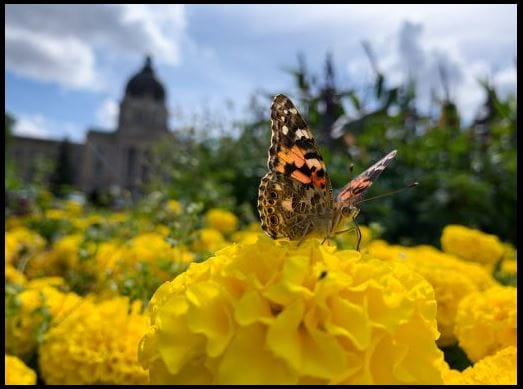Released on August 21, 2020
Nature enthusiasts, gardeners and aspiring scientists of all ages are invited to explore and learn about Wascana Centre’s new pollinator projects, the highlight being more than 1,000 new leafcutter bees hatched from 12 kits located throughout the park.
“The forestry and horticulture team at the Provincial Capital Commission has introduced several new pollinator projects this summer to increase the health of trees, plants and vegetation in the park,” Minister Responsible for the Provincial Capital Commission Lori Carr said. “Bees, butterflies and new pollinating ground cover will help grow and maintain a strong ecosystem.”
The science of pollination fuels healthy growth and diversity within the park’s ecosystem. The benefits include cleaner air, less erosion, stabilized soil and healthy wildlife. As an added bonus the nutrients, water and oxygen provided to the plants create extra protection in extreme weather. Visitors to Wascana Centre can witness nature at work by searching for butterflies and observing the leaf cutter bees as they pollinate the park.
The bees and butterflies may be found buzzing in the newly installed ground cover Bee Turf. The turf is a lawn replacement blended from mixed clovers and low-growing wildflowers. It is intended to replace lawn in urban settings in order to reduce maintenance costs and increase habitat and forage for pollinators. Other popular locations for observation include the Queen Elizabeth II Gardens and Arboretum Park located along 23 Avenue just east of Wascana Rehabilitation Centre.
“When searching for pollinators be careful to not get too close to disturb them. You can learn a lot about pollinators and how flowers adapt to their foraging styles,” Ecologist for the Provincial Capital Commission Sarah Romuld said. “Bees will seek out open, bowl-shaped flowers they can crawl into for the nectar and disperse the pollen. Butterflies can access smaller areas in the flower where other pollinators can’t fit.”
About leafcutter bees:
Leafcutter bees are small but efficient pollinators that stay within approximately 100-200 m of their nest. They can forage on many different flower varieties, shapes and sizes, visiting thousands of blossoms in one day.
About painted lady butterflies:
Painted lady butterflies are the world’s most widely-distributed butterfly. While their caterpillar stage tends to eat thistles, as an adult butterfly, they are not picky. They may have many different host plants, increasing their pollination potential.
The Provincial Capital Commission is committed to environmental stewardship through research, development and educational opportunities. The pollinator projects in Wascana Centre will ensure that it remains a thriving natural oasis in an urban setting.

About Wascana Centre:
Wascana Centre is internationally known as a beautifully landscaped park surrounding a 120-hectare lake located in the heart of Regina. It was established in 1962 to be a place for recreation and beauty. Wascana Centre includes 2,300 acres of urban land that provides countless functions and services to the community, resulting in an area of immeasurable value as a place of work, education, recreation and natural preservation.
-30-
For more information, contact:
|
Kerri Ward-Davis
Provincial Capital Commission
Regina
Phone: 306-787-8544
Email: kerri.warddavis@gov.sk.ca
|

